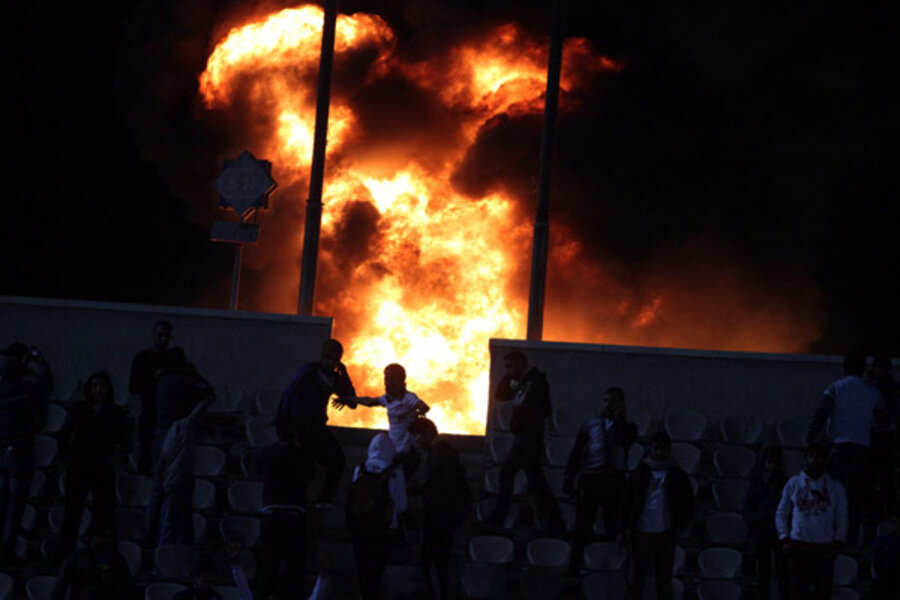Egypt soccer tragedy claims 73 lives and fans rumors
Loading...
A soccer match between Masry and Ahly in the Egyptian city of Port Said ended in tragedy today, with at least 73 people killed in a melee that broke out after the final whistle. Given the context of Egypt's political transition, the story is liable to become about a lot more than the latest in the long list of violent incidents started by soccer hooligans.
Egypt's national soccer competition was suspended almost immediately after the violence for fear of a violent repeat. An emergency session of parliament has been called for tomorrow to discuss the tragedy.
The melee started with a pitch invasion following the 3-1 upset for Masry over Cairo-based Ahly, the Yankees or Manchester United (depending on your preferences) of Egyptian soccer. The footage from the end of the national broadcast of the match holds only the barest hint of the violence that was to come, with a few scuffles breaking out and Ahly's players running for their dressing room.
But the footage shows the clear presence of large numbers of riot police at the stadium -- standard for when Egypt's big clubs play, since many of them have bands of fanatic supporters who call themselves "Ultras" in the style of Italian soccer hooligans. Apparently, soon thereafter the security forces melted away or refused to intervene as the attacks broke out, killing at least 73 according to Egyptian state television.
“The security forces left us, they did not protect us," Mohamed Abou-Treika, a star player for Ahly, screamed over the phone from the visiting locker room, Al-Ahram reported. "One fan has just died in the dressing room in front of me."
Mr. Abou-Treika is one of the country's most prominent sports stars, and that dramatic phone call will probably be replayed for days in Arab language satellite TV. Stories like that have many Egyptians speculating wildly that the military is responsible. Activists against the military junta in particular are wondering if the violence was engineered to try to frighten the general public into backing a law-and-order military rule.
There is of course no evidence for that. But in a situation as fluid as Egypt's, misplaced distrust can have just as much political impact as the real thing. And many big political decisions remain. Though a new parliament has sat, presidential elections to replace the generals currently ruling Egypt have not yet taken place, nor have the precise details of how Egypt's old constitution will be rewritten been determined.
And whatever solidarity there once was between political factions built on shared distaste for the Mubarak dictatorship has evaporated under the weight of the country's new political realities. The new parliament is dominated by the Muslim Brotherhood, who used its own activists to corral liberal protesters seeking to march on parliament yesterday, many of whom the younger brothers had made common cause with at the start of last year.
The tragedy itself will underscore the international narrative of Egypt having become a much more dangerous and unpredictable place than it once was -- however fair that assessment might be. Foreign investment evaporated last year, and there's little hope for a change soon. The soccer violence happened the day after 25 kidnapped Chinese workers were released on the Sinai peninsula. The Chinese worked at an Egyptian military-owned cement plant there, and were kidnapped by local Bedouin seeking the release of a tribesmen in state custody.
Interesting will be the response of the Ultras Ahlawy, Ahly's hard-core supporters group. They and the supporters' clubs from a few other teams were deeply involved in organizing defenses at Tahrir Square during the uprising against Mubarak -- bringing organization, and know-how in dealing with the country's riot police. Though football fans, they seem to take as much delight in taunting and jeering at the police as they do in celebrating goals.
The Ultras occasionally flexed their muscles on the streets of Cairo since the revolutoin. The killing of an Ahly supporter by police after a match in September led to a mass show of strength by the Ultras, who marched on the Israeli embassy venting their fury and sacked the place.
[ Video is no longer available. ]







